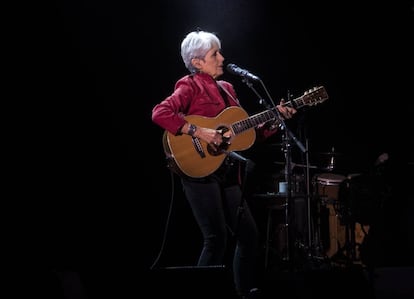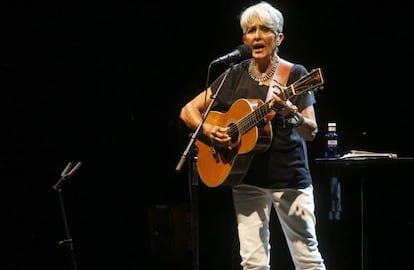Folk legend Joan Baez comes to Spain on her farewell tour
Now 78, the music icon will perform in San Sebastián, Sitges, Girona and Madrid before retiring from the world stage


Joan Baez – the female icon of US folk music in the 1960s and ’70s, a singer whose piercing soprano tone dazzled Bob Dylan – is losing her voice.
The assertion is not the result of a nasty critical review or a secret suspicion harbored by her fans. The 78-year-old artist is the first person to admit that her vocal cords are not what they used to be: “This muscle that makes the difference is not making it anymore, it needs a lot of work,” she says in a telephone conversation with EL PAÍS.
I wasn’t happy until the age of 50
Joan Baez, singer
Rather than risking losing her voice during a live performance, Baez has organized a farewell tour that will bring her to Spain on July 24, 25, 27 and 28. Her first Spanish appearance will be at the San Sebastián Jazz Festival, followed by the Jardines Terramar Festival in the Catalan city of Sitges, the Porta Ferrada Festival in Girona and the Universal Music Festival at Madrid’s Teatro Real.
After a career spanning six decades, the former muse of such dissimilar individuals as Bob Dylan and Steve Jobs remains committed to social justice, just as she was back in the days of her civil-rights activism with Martin Luther King. But what will she do after she retires from the stage?

“Very simple: finish a documentary [about herself], paint, keep working on my autobiography, continue the fight for social progress... In my country, we no longer live in a democracy,” she says with the weariness of someone who has lost several battles.
“You can insist on fighting to change the world. But I never could have imagined what’s going on now. Everything is crumbling. We are in a state of shock. It simply overwhelms us,” says the singer about her state of mind under the Trump administration.
The NY artist with Hispanic roots
When Spaniards started listening to Joan Baez in the 1970s, the dictator Francisco Franco was still alive. By then, the singer already had a considerable career behind her. It was the golden age of protest songs and singer-songwriters, and Baez’s angelical voice resonated with audiences here.
In 1974, she released Gracias a la vida, a collection of Latin American songs that opened up the Spanish-speaking market for her. The album was so convincing that many listeners believed they were hearing a native Latin American singer. Baez was in fact born on Staten Island in New York, although her father was from the Mexican state of Puebla. "I barely speak Spanish," she confesses.
To deal with her political depression, Baez continues to resort to doses of poetic adrenalin by authors such as her old favorite Walt Whitman, who best captured the vitality of a country under construction. But Baez recommends taking small doses: “Hope can be a dangerous thing if you don’t get some distance. It can hurt you and make us prisoners of false hopes.”
She herself learned the hard way. “I wasn’t happy until the age of 50,” she confesses. “I was unable to enjoy what I had achieved, I allowed myself to get caught up in too many obstacles. Now I feel much better.”
Her lack of satisfaction had nothing to do with her public battles, but with her own personality. “I felt very miserable, it was an intimate matter that [...] prevented me from feeling happy with myself, at peace. It was pure neurosis and I had to get psychological treatment.”
The woman who dated Apple founder Steve Jobs in the 1980s does not believe that technology can deliver on its promise of a better world. “I am terrified that people no longer look one another in the eye,” she says. “We are living in a real mental disorder. Today’s kids are not in healthy contact with nature, and people no longer appreciate the importance of a tree.”
English version by Susana Urra.
Tu suscripción se está usando en otro dispositivo
¿Quieres añadir otro usuario a tu suscripción?
Si continúas leyendo en este dispositivo, no se podrá leer en el otro.
FlechaTu suscripción se está usando en otro dispositivo y solo puedes acceder a EL PAÍS desde un dispositivo a la vez.
Si quieres compartir tu cuenta, cambia tu suscripción a la modalidad Premium, así podrás añadir otro usuario. Cada uno accederá con su propia cuenta de email, lo que os permitirá personalizar vuestra experiencia en EL PAÍS.
¿Tienes una suscripción de empresa? Accede aquí para contratar más cuentas.
En el caso de no saber quién está usando tu cuenta, te recomendamos cambiar tu contraseña aquí.
Si decides continuar compartiendo tu cuenta, este mensaje se mostrará en tu dispositivo y en el de la otra persona que está usando tu cuenta de forma indefinida, afectando a tu experiencia de lectura. Puedes consultar aquí los términos y condiciones de la suscripción digital.








































